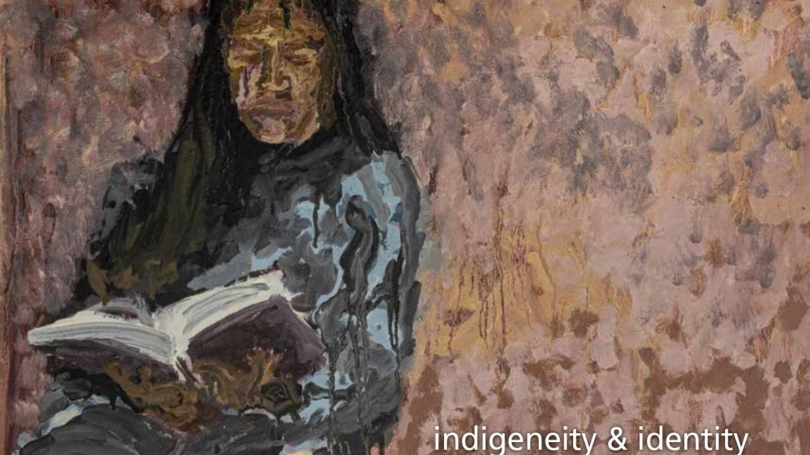
- Undergraduate
- Off-Campus Program
- Research
- News & Events
- People
Back to Top Nav
Back to Top Nav
Professor Nicholoas Reo recently served as guest editor for a special issue that appeared in Contexts Magazine, a peer-review publication from the American Sociological Association. The special issue focuses on Indigenous Sociology, and the cover art is by Dillen Peace, a painting of another alum, Tia Yazzie.
Reo and his coauthor, Angela A. Gonzales, write about the new issue:
In his 1992 Annual Review of Sociology article, Matt Snipp lamented the lack of sociological attention to American Indians due to the discipline's focus on urban behavior and social organization. In the near three decades since, sociological research on Native Americans in the lower-48 U.S. context as well as in relation to Alaskan Natives, Native Hawaiians, and Indigenous peoples globally, has grown incrementally. With notable contributions by both Native and non-Native sociologists. In his 2018 ASA presidential address, Eduardo Bonilla-Silva prevailed upon sociologists to recognize settler colonialism as a contemporary social force. Equally important is the recent formation of the ASA section on Indigenous Peoples and Native Nations.Prompts like Bonilla-Silva's invite us to think about how sociology might be transformed by acknowledging and interrogating the various forms of colonialism and how they have manifested in the production and validation of sociological knowledge.
We are excited to present this special issue on Indigenous sociology for several reasons. First, we are experiencing a new, sizable wave of social justice activism within Indigenous populations that parallels and intersects with Black Lives Matter, Me Too, and other related movements in important ways. The more prominent Indigenous movements, from Standing Rock to Mauna Kea, are entering the public's everyday consciousness and finding their way into sociological research and syllabi. Second, the interdisciplinary field of Indigenous studies is growing rapidly and generating new theoretical spaces relevant to sociology. Concepts central to Indigenous studies such as settler colonialism and Indigenous resurgence, as well as anti-colonial research methodologies and ethics are particularly relevant to sociology. Third, technologies of identification from census enumeration to genetic ancestry testing underscore the transformation in the meaning and use of "race" as a social and political category.
Equally important is the recent formation of the ASA section on Indigenous Peoples and Native Nations.
The contributions in this special issue present important ways for thinking through questions and concepts about race and inequality, two central concerns in sociology. Concerning the former, Gonzales and Kertesz' article discusses how the "scientifically flawed and outdated concept of racial blood" as maker and marker of Native American identity remains a powerfully entrenched idea. Mail order ancestry DNA tests are solidifying longstanding misconceptions about the biological basis of race, and our political and cultural understandings of individual and collective identity. Collins presents related concerns in his discussion of blended Native American and African/African American kinship relations. He critiques the insidious ways that slave narratives and one-drop racial analytics shape understandings of family, tribal history, and belonging. In her article, Huyser problematizes the multiple ways the U.S. government has shaped American Indian identity and life outcomes for Native people, especially through the Bureau of Indian Affairs' certifications of degree of Indian or Alaska Native blood and the U.S. Census Bureau's shifting methodologies for enumerating the American Indian population. She suggests social scientists rely on multidimensional concepts of American Indian identity and "critically evaluate group boundaries and boundary making in analyses."
In their article, Chin and Brayboy theorize that, for people of color in the U.S., structures of inequality and oppression connect into a larger superstructure of violence, grounded in what they call terrortory (i.e., "the lawful use of fear and violence to alienate land and people in the name of profit"). Here, they articulate three distinct forms of Indigenous erasure that contribute to the making of terrortory: physical erasure by force and acts of violence, narrative erasure by vanishing Indian tropes, and erasure through deficit-orientations in research. Mauer examines a case that could easily fit into Chin and Bray-boy's terrortory analytic while challenging simplistic conceptualizations of resilience in social and ecological research. Based on work with the Lower Elwha Klallam Tribe and its citizens, Mauer examines the impacts of the damming and undamming of the Elwha River on Indigenous lifeways and economies. Where other scholars have viewed the Elwha River restoration as a beacon of hope and resilience, Mauer's work shows how both the damming and restoration of the River have been sources of trauma for Klallam families. Klallam families are also hopeful about the future of their tribal nation and as Mauer suggests, narratives of hope and trauma should be listened to together if we want to understand the complexity of Klallam experiences. In his article, Derek Jennings examines the disproportionate impacts the COVID-19 pandemic is having on Indigenous communities. Taking an indigenous perspective, he offers insight on health and healing rooted in the practice of traditional hunting practices. In the Policy Brief, Evans writes about the continuous battle for Native American lands in light of U.S. Supreme Court case law.
As guest co-editors of this special issue, we want to thank the editors of Contexts for this opportunity to invite readers to think broadly about a range of issues and topics through the lens of indigenous social phenomena and experience. We hope this special issue inspires readers to talk about and sit with the ideas shared by the authors in this collection and continually rethink how the discipline might be enriched through the inclusion of and attention to contemporary indigenous peoples.
Contexts is a quarterly magazine that makes cutting-edge social research accessible to general readers. It's the public face of sociology. In Contexts, you'll find the best sociological ideas and research; fresh perspectives, clear, concise thinking, and jargon-free reporting; and a thought-provoking look at modern life. It includes feature articles, culture and book reviews, and photo essays, as well as analysis of the latest social science research. An official publication of ASA.